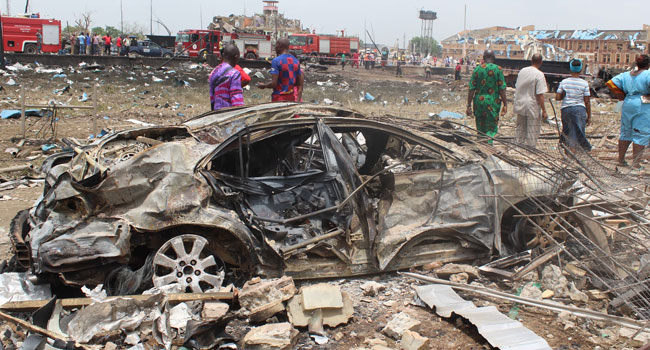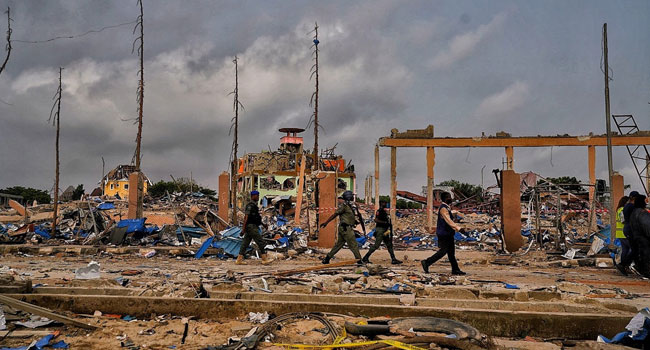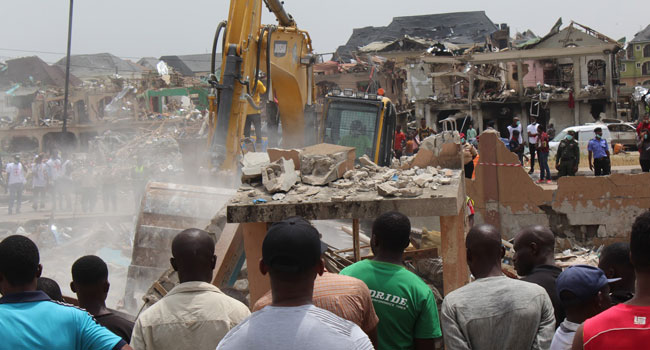Lekan Olaoluwa, 29, was in church when the blast happened. He thought it was a missile attack. The roof caved in, glass windows shattered, injuring people around him. The rest hurried out, trying to understand what had happened. “We were still doing Sunday School, the service had not fully started,” he said. On getting home, Olaoluwa met a bald building – the roof had been torn off.
On Sunday, March 15, thousands of Lagosians reported they had heard an earth-shattering explosion around 9 am. The explosion’s ground zero was Abule-Ado, a community that sits beside the Lagos International Trade Fair Complex, a 350-hectare shopping facility along the Lagos-Badagry expressway. Surrounding communities include Festac Town, a federal housing estate which derives its name from FESTAC ‘77, the month-long event that showcased African music and fine arts to more than 16,000 visitors from across the globe in 1977.
According to more than 20 eyewitnesses who spoke to Channels Television for this story, the explosion was followed by a raging inferno that licked up houses with alacrity. One eyewitness said firemen were on site about 30 minutes after the fire started, but there were not enough trucks of water to curtail the ongoing destruction. According to Joseph Orji, the eyewitness, it was like bringing an umbrella to repel a hurricane.

On Sunday, rescue services recovered at least 17 bodies from the explosion site, according to the Director-General of the Lagos State Emergency Management Agency (LASEMA), Olufemi Oke-Osanyintolu. The operation, coordinated by several government agencies and the Red Cross, continued on Monday. As at the time of filing this report, three more bodies had been recovered. Many others had been rushed to the hospital. One three-year-old girl was found alive in the resulting rubble.
One of the casualties was Revd. Sist. Henrietta Alokha, the school principal of Bethlehem Girls College, a catholic institution with boarding facilities. By Monday, Bethlehem College’s warren of sepia-coloured buildings had fallen flat like Jericho’s walls, reduced to rubble. The grounds, patrolled by an excavator seeking buried bodies, looked like a wasteland.
The scale of the destruction attracted thousands of sympathisers to Abule-Ado early Monday morning. Hundreds gathered to watch an excavator drill through the rubble, while others moved around, hands-akimbo, surprise plastered on their faces. Security officials, including the police, army, and civil security agencies, were on standby and frequently tried to shoo away the crowd.
“It was a very pathetic situation,” Razak Akande, a Red Cross official who took part in the rescue activities on Sunday, said. “No human being gets there and not cry.”
It was easy to see why. This wasn’t just another explosion. It was different. The damage extended for miles. Parts of the Lagos International Trade Fair Complex were also affected. Cars that avoided the fire had their windows and windscreen shattered. The air reeked of gasoline.

“There is nothing I can do except to find a way to fix our roof,” Olaoluwa, the 29-year-old who is waiting to be called up for national youth service, said. But others closer to the tragedy, those who had lost loved ones and entire properties to the fire, were not so hopeful. Women sobbed. Men milled around, grief-stricken, uncertain of the future. “What will I tell you?” One man standing in front of his ruined school told this reporter. “It is better for me to endure my pain alone.”
What caused the explosion?
By Sunday evening, the Nigeria National Petroleum Corporation (NNPC) released a statement, explaining the cause of the blast.
“The blast occurred after a truck hit some gas cylinders stacked in a processing plant located near the corporation’s System 2B pipeline right of way,” NNPC spokesman, Kennie Obateru, said.
Obateru added that preliminary findings indicated the blast had also affected some NNPC pipelines which forced the corporation to immediately halt ongoing pumping operation on the Atlas Cove – Mosimi pipeline.

But the more than 20 eyewitnesses who spoke to Channels Television scoffed at NNPC’s explanation. Most of them were still visibly shocked and emotionally distraught. Their argument was that the scale of the destruction and how far it travelled (Lagosians 35km away from Abule-Ado said they heard the blast) didn’t correlate with the nature of gas explosions. Some reported that the community had witnessed some gas explosions in the late 2000s, and the scale of destruction was nowhere the March 15 blast.
One of the eye-witnesses, Emmanuel Obi, said it had to be a bomb. On Monday morning, he was wearing a pair of borrowed singlets and shorts, giving interviews in front of his charred building. “The only thing I have left is the clothes I wore to church,” he said. “My neigbour lost his only son.”
Another eyewitness, Ugochukwu Eze, 25, was washing clothes when he went out to buy more detergent. From a distance, he saw white smoke reaching for the skies. Then he heard the explosion. “I couldn’t hear anything,” he said. “The ground was shaking and everybody was running for their lives.”
Yet another eyewitness, Innocent Oranagwa, 56, was in Abule-Ado, some minutes before the blast, to do some shopping. His bike was approaching a junction when he noticed white smoke fizzing out from the ground. He asked the bike driver to use an alternative route. Less than a minute after making the diversion, he heard an explosion. It had to be a bomb, he told this reporter.
All the stories were similar – chilling accounts of sudden disruption and fear and loss.
“This is a bomb,” Eze said. “I live here and I witnessed it.”
What Next?
Abule-Ado is one of many residential communities in Lagos existing alongside petroleum pipelines. It is also part of a wider community, Satellite Town, which was inundated with some 50 tank farms in the 2010s. According to a 2019 report, the tank farms, which are operated by 30 oil marketing companies, house over 2.5 trillion litres of petroleum. Satellite Town residents have repeatedly called for the relocation of the farms, which attract hordes of tankers and, consequently, fierce gridlocks.
On Sunday evening, hours after the blast, NNPC chief, Mele Kyari, visited the blast’s ground zero. He acknowledged there were problems around standard processes “that are not optimum” and warned people not to build houses around pipelines. “It is very dangerous and they should respect our right of way,” he said. “It is for the safety of all and it is about ensuring people are safe.”
President Muhammadu Buhari described the explosion as a “tragedy”.
“I must confess I have never seen anything of this magnitude before, it’s like a war zone,” Lagos State Governor, Babajide Sanwo-Olu said during his inspection on Monday morning. He announced a N2bn relief fund for victims of the explosion, with an immediate injection of N250m. The Governor encouraged other Nigerians and organisations to contribute.
Also, Sanwo-Olu announced an investigative committee headed by the Deputy Governor, Obafemi Hamzat, to look into the cause of the explosion.
For Oscar Martins, 45, who lost his cousins in the ensuing fire, the committee is the most important thing. “Money is not the most important thing,” he said. “They have to investigate.”

Comments
Post a Comment